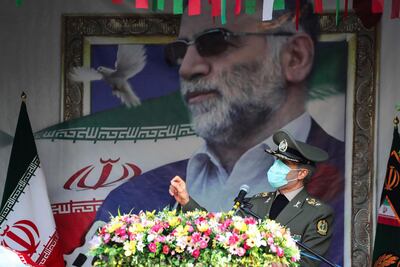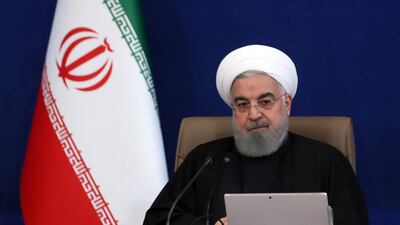President-elect Joe Biden says he wants the US to rejoin the nuclear deal once he takes office next month. The only problem is that, with Iran adopting an increasingly defiant tone over its nuclear activities, there are serious questions about whether the nuclear deal will still be alive by the time Mr Biden enters the White House.
Iran had been intensifying its illegal nuclear activities long before Dr Mohsen Fakhrizadeh, the country’s chief nuclear scientist, was killed, together with his wife, as he drove through a suburb of Tehran last Friday.
There is a widespread acceptance in Western security circles that Dr Fakhrizadeh was assassinated because of mounting concerns over the recent surge in activity in Iran’s nuclear programme.
In response to US President Donald Trump’s 2018 decision to withdraw from the Joint Comprehensive Plan of Action (JCPOA), the nuclear deal’s official title, Tehran has gradually resumed work on key elements of its nuclear programme, many of which constitute blatant breaches of the deal. Consequently Iran has now accumulated a stockpile of enriched uranium that is 12 times the amount permissible under the agreement, and has also begun testing advanced centrifuges that are also barred by the deal. In addition, construction work is taking place at the main Natanz enrichment facility to build new underground bunkers.
As the country’s top nuclear scientist and a senior officer in Iran’s Islamic Revolutionary Guard Corps, Dr Fakhrizadeh, who has been dubbed the father of Iran’s nuclear programme, would have been deeply involved in all these activities, which Western intelligence officials believe are part and parcel of Tehran’s long-term ambition of developing its own nuclear weapons arsenal.
Although no one has claimed responsibility for his assassination, Iranian officials have accused Israel’s Mossad intelligence agency of carrying out the highly sophisticated assassination plot. The Iranian scientist was a well-known figure in Israeli security circles, and was publicly named by Israeli Prime Minister Benjamin Netanyahu in 2018 when he revealed details of documents that the Israelis claimed were proof Iran was working on developing nuclear weapons.
Nor can the possibility be ruled out that the Trump administration was in some way involved in the attack. Mr Trump has made it clear that he wants to intensify pressure on Tehran before he leaves office. US Secretary of State Mike Pompeo, in an interview with The National, also said that the administration was not going to rule out the possibility of taking military action against Iran. The Trump administration, by increasing the pressure on Tehran, is also aiming to make it much more difficult for Mr Biden to revive the JCPOA.
Irrespective of who was responsible for the scientist’s murder, Iran’s reaction to the killing is certainly going to make Mr Biden’s hopes of re-engaging with Tehran much harder. Iran’s top political chamber earlier this week gave final approval to a bill designed to end the country's cooperation with the International Atomic Energy Agency (IAEA), the UN-sponsored body responsible for monitoring Iran’s nuclear activity.
Relations between the IAEA and Tehran have recently become strained after UN inspectors accused Iran of breaching the nuclear deal, while also raising concerns about unexplained particles of fissile material found during inspections of Iran’s nuclear sites.

With the ratification of the bill by Iran’s Guardian Council, the body comprised of hardliners that oversees the Iranian constitution, President Hassan Rouhani will be obliged to end cooperation with international nuclear inspections unless the US lifts key sanctions by February, giving Mr Biden’s administration just weeks to make a diplomatic breakthrough.
Moreover, the president-elect will have to achieve this at a time when Iran is adding to its stockpile of fissile material by producing 20 per cent enriched uranium, another breach of the JCPOA. Producing such material will potentially reduce the time Iran needs to make preparations to acquire a nuclear weapon.
The move by the Guardian Council is an attempt by the regime’s hardliners to seize control of the nuclear agenda, after what they regard as the failure of Mr Rouhani’s diplomatic efforts to reduce global tensions over Iran’s nuclear activities.
Mr Rouhani’s primary objective in negotiating the nuclear deal — and the main reason he was elected to office in the first place — was to have crippling economic sanctions lifted. But while signing the nuclear deal in 2015 resulted in the revival of Iran’s economic fortunes, Mr Trump’s decision to withdraw from the deal in 2018 and re-impose sanctions has had a devastating impact.
And with presidential elections due to take place in Iran in June next year, the hardliners are positioning themselves to consolidate their power base in Tehran.
The complexity of Iran’s political landscape, together with the upsurge of activity on the country’s nuclear activities, certainly means that Mr Biden’s hopes of reviving the nuclear agreement will be a significant challenge.
Interviewed by The New York Times earlier this week, Mr Biden said he was still committed to re-entering the Iran nuclear deal so long as Tehran returned to "strict compliance" with the 2015 nuclear deal.
“The best way to achieve getting some stability in the region is to deal with the nuclear program,” said Mr Biden. But the president-elect also made it clear that his administration was keen to broaden the terms of the deal to cover other aspects of Iran’s nuclear programme, such as its ballistic missiles.
“In consultation with our allies and partners, we’re going to engage in negotiations and follow-on agreements to tighten and lengthen Iran’s nuclear constraints, as well as address the missile programme,” he said, adding that Washington always has the option to snap back sanctions if Iran failed to address these issues.
Even so, Mr Biden’s prospects of entering a new round of negotiations with Tehran will be negligible if Tehran persists with its present policy of intensifying its nuclear activities, instead of complying with its international obligations.


